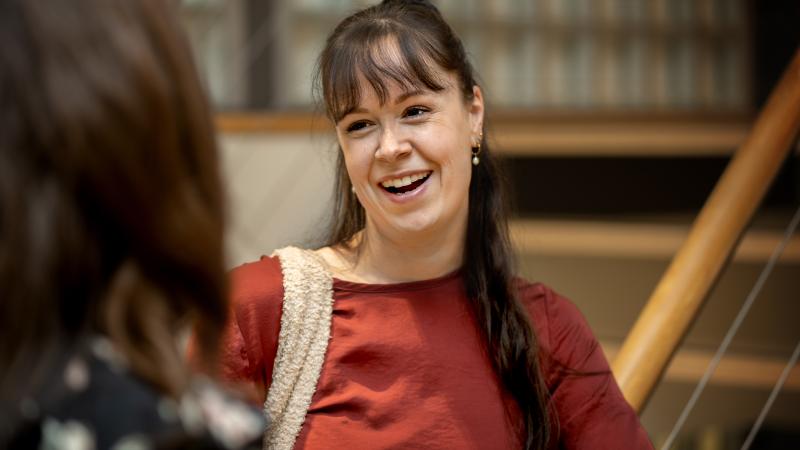The story of Deborah, senior employee DJO
‘Our team is a necessary link that completes the chain’ Deborah has noticed that a lot of people who once left the Immigration and Naturalisation Service (…

Our work has a lot of influence on people’s lives. That is why we must take careful decisions.
Mellanie was a dancer for almost eight years and she gave dance lessons. ‘I knew already then: I do not want to and will not always be able to continue doing this. Consequently, when I was about thirty years old, I started searching for a different job. For work by which I can help people. And I do that now at the IND.’
She sits for part of the day at the IND desk in Zwolle. ‘Applicants pick up their residence documents at my desk. I help for example asylum seekers who have been waiting for a residence permit for years. Then I see how relieved and happy they are that they are allowed to stay in the Netherlands. Asylum seekers can also come to me for a W-document. They can use it to identify themselves if they do not yet have a residence permit. I also take a photograph of an applicant’s face and I take his or her fingerprints. We use that photo for the residence permit and the W-document. And with the fingerprints we can check whether we are dealing with the right applicant.’
Mellanie also supports two twee managers of the IND desk in Zwolle. ‘I arrange and sort a lot out for them. For instance I examined how we can shorten the waiting times at the desks. The receptionist now links the waiting number of an applicant to that person’s alien number. When I call up this applicant this enables me to see his or her alien number on my screen. When I enter that number, then I see for which residence document someone has come and I already have that document ready. I did that before only when someone was standing at my desk. So an applicant loses less time on collecting his or her residence permit. In addition my managers noticed that many asylum seekers did not come to collect their W-documents. What proved to be the case? Because of an error in our digital system we had not let them know that this document was ready. I sorted out how we can still give these people their documents. To do so I now call on them in asylum seekers’ centres, as a result of which they no longer need to come to the IND desk.’
Before she came to work at the IND, Mellanie was sport manager at a top sport school. ‘I coached students who wanted to become top sportspersons. And I had only little to do with other co-workers. That is very different now. I work in a team of about thirty support staff members and I am the contact person for the host and hostess and the receptionist of the IND desk in Zwolle. This caused me to feel tense at the beginning. I did not know very well what I could expect. But later on it turned out to be better than expected. Working together with co-workers actually makes my work pleasant. I gain new knowledge and ideas. And we are better able to help applicants.’
‘I like to work vigorously’, she said, laughing. ‘When I think of something new, I want to do it straight away. But that is not always possible at the IND. Then different co-workers first have to discuss such an idea. And you are a few weeks further just like that. That is annoying to me. but I also understand it. Our work has a lot of influence on people’s lives. That is why we have to take careful decisions. On the other hand, my managers ask for my opinion and ideas. That feels good.’
‘I would like to develop myself further in my job’, says Mellanie. ‘The IND also gives me the opportunity to do so. I can actually take various courses and trainings. When I started as senior support staff member, I underwent training in ‘Document Checking DOC 1’. That is where I learnt what false documents look like. That is important for me to know because I have to check passports and identity cards of applicants. I have also started a Lean training course. This course centres on how we can organise our work so that we can help applicants more efficiently and quicker. I think that I can benefit a lot from this.’
‘Our team is a necessary link that completes the chain’ Deborah has noticed that a lot of people who once left the Immigration and Naturalisation Service (…

‘My contact with the candidates is personal and unique’ Has a vacancy remained unfilled for months? Or is a job difficult to carry out? Then Fatih comes…
‘Privacy is a right, not a privilege' Nowadays, personal data can be easily misused. With merely a profile picture from social media,…